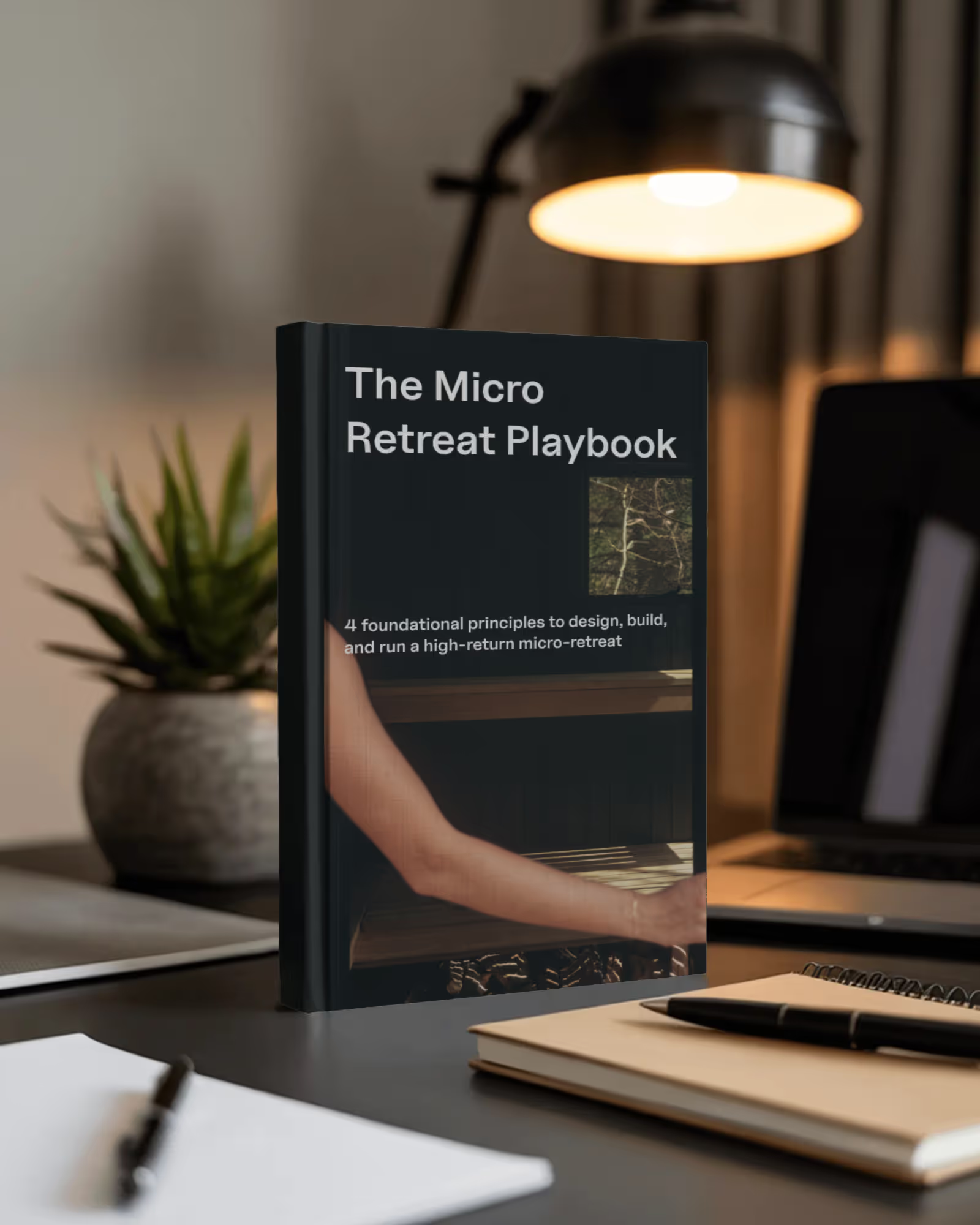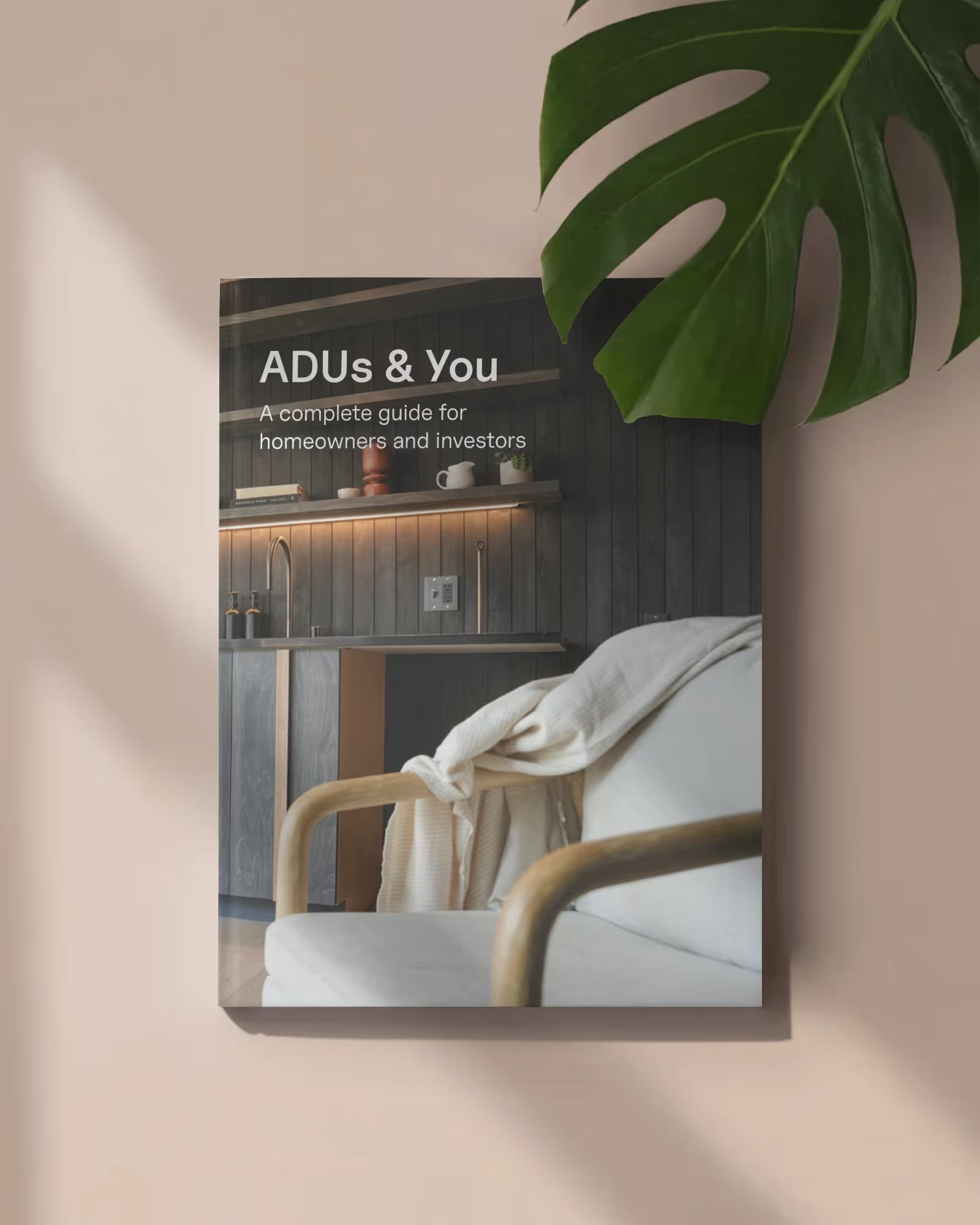Maximizing Your ADU ROI: Tips and Strategies
The allure of an Accessory Dwelling Unit (ADU) isn't just in its charming, compact footprint or the potential to house family members. It's also about the financial boon it can bring to your property.
Whether it's a detached backyard cottage, an attached in-law suite, or a garage conversion, ADUs offer a flexible and cost-effective way to add value to your property. But how do you maximize your ADU's return on investment (ROI)? Let's explore the landscape of ADU benefits, strategies, and insights that can transform your property into a lucrative investment.
Are ADUs A Good Investment?
ADUs offer a unique blend of independence and proximity, catering to various living arrangements, whether for aging parents, adult children, or as a rental opportunity. The question on every homeowner's lips: "Do ADUs increase property value?" The short answer is "Yes". Here’s How:
Income Generation
One of the most compelling reasons to invest in an ADU is the potential for rental income. In competitive rental markets like Denver and Boulder, ADU rental income can generate anywhere from $1,500 to $4,000 per month, depending on size, location, and amenities. This additional income can help homeowners cover mortgage payments, fund property improvements, or build long-term wealth.
Property Value Increase
How much does an adu increase property value? A well-designed and permitted ADU can significantly enhance property value. Studies show that homes with ADUs can sell for 20-35% more than comparable properties without them. This is because ADUs increase both the functional space and potential income-generating opportunities of a property.
.png)
Factors affecting ADU ROI
1) Quality of Construction
The materials and craftsmanship used in building an ADU play a significant role in determining its long-term value. A well-built ADU with durable finishes, proper insulation, and energy-efficient appliances attracts higher rents and boosts property value. On the other hand, poor construction can lead to costly repairs, reducing the overall ROI. Prefabricated ADUs, like those offered by ELMNTL, provide a controlled, high-quality build with fewer surprises and faster construction timelines, ensuring a stronger return.

2) Size and Design
The size of an ADU directly impacts its rental income and resale value. Larger ADUs, such as 2-bedroom units, tend to attract families or long-term renters willing to pay higher rent, but they also come with higher construction and permitting costs. Smaller ADUs, such as studios or 1-bedrooms, are more affordable to build and can still generate solid rental income, depending on the local market. Thoughtful design choices, including open layouts, natural light, and modern finishes, make an ADU more appealing to renters and buyers alike. Additionally, detached ADUs typically command higher rents due to increased privacy, whereas attached ADUs are more cost-effective but may not be as attractive to renters seeking independent living spaces.

3) Local Rental Demand
The rental market in your area is a key factor in determining ADU profitability. Cities like Denver, Boulder, and Colorado Springs have strong housing demand, making ADUs a lucrative investment. Homeowners can choose between short-term rentals (Airbnb, VRBO) for higher cash flow or long-term tenants for stability. Understanding your target market—whether young professionals, students, or retirees—can help maximize rental income and occupancy rates.

4) Zoning and Permitting
The local regulatory environment plays a crucial role in determining the feasibility and profitability of an ADU. Some Colorado cities, like Denver, have adopted ADU-friendly policies, making it easier to secure permits. However, some municipalities still have strict zoning laws, requiring homeowners to navigate setbacks, height restrictions, and occupancy rules. The permitting process can also lead to unexpected costs and delays, which can affect overall ROI. Fortunately, Colorado is gradually easing ADU restrictions, making these investments more viable in an increasing number of areas.

Calculating The ROI of ADUs in Colorado
The addition of ADUs in Colorado can be especially lucrative. The high demand for housing makes ADUs a wise investment. They provide a solution to the housing shortage and offer homeowners a chance to capitalize on the thriving rental market. Colorado's scenic beauty and vibrant cities attract a diverse population, increasing the demand for versatile living spaces like ADUs.
Furthermore, Colorado's unique lifestyle appeal—ranging from outdoor adventures to cultural attractions—draws renters who are willing to pay a premium for well-located, quality ADUs. This demand further solidifies the financial advantages of adding an ADU to your property in this region.

Detached vs. Attached ADU Value
The value of an ADU depends on whether it is detached or attached to the main residence.
Detached ADUs
- Offer greater privacy and flexibility for tenants or homeowners.
- Often command higher rental rates due to their standalone nature.
- Increase total livable square footage, boosting resale value.
- Require additional infrastructure, such as separate utilities and foundation work, leading to higher upfront costs.

Attached ADUs
- Share a wall with the primary residence, reducing construction costs.
- Can be a more affordable option for homeowners who want to maximize existing space.
- May be subject to size limitations depending on zoning laws (e.g., limited to 50% of the main home’s square footage).
- Offer less privacy compared to detached ADUs, which can impact rental desirability.
While detached ADUs typically add more value due to increased privacy and rental potential, attached ADUs remain a strong investment for homeowners looking for a cost-effective way to expand their property.
How Prefab ADUs Increase Property Value
Prefab ADUs are revolutionizing the way homeowners in Colorado expand their living spaces. Unlike traditional construction, which can be time-consuming, costly, and unpredictable, prefabricated ADUs offer a streamlined, cost-effective, and environmentally friendly solution. Whether you're looking to generate rental income, accommodate family members, or increase your property’s value, ELMNTL’s modular ADUs provide an efficient and aesthetically pleasing option tailored to the demands of Colorado’s housing market.
.png)
.png)
.png)
Lower Costs Without Sacrificing Quality
One of the biggest advantages of prefab ADUs is their cost efficiency. Traditional ADU construction requires extensive labor, which can be subject to delays, inefficiencies, and fluctuating costs. In contrast, modular ADUs are built in a controlled environment, reducing labor expenses and material waste. This allows for predictable pricing and lower overall costs for homeowners.
Additionally, prefab ADUs eliminate many unexpected costs that arise during on-site construction, such as weather delays, subcontractor scheduling issues, and supply chain disruptions.
Faster Construction for Quick Returns
Time is money, especially when investing in an ADU for rental income. Traditional construction projects can take anywhere from 6 to 12 months, depending on permitting delays, material shortages, and weather conditions. Prefabricated ADUs, on the other hand, can be installed in as little as 4-6 months, allowing homeowners to start earning rental income or utilizing the space much sooner.

Sustainability & Energy Efficiency
With Colorado’s growing focus on sustainability, prefab ADUs are an excellent choice for eco-conscious homeowners. Many modular units are designed with energy efficiency in mind, incorporating:
✔ Eco-friendly materials, such as sustainably sourced wood and hemp insulation.
✔ Energy-efficient windows and doors, reducing heat loss and improving indoor comfort.
✔ High-performance building envelopes, minimizing energy consumption.
✔ Smart home technology, including automated lighting and climate control for optimized energy use.
By choosing a sustainably built prefab ADU, homeowners can reduce their carbon footprint while also lowering long-term utility costs.
What to Consider Before Investing in an ADU:
1. Legal and Compliance Considerations
Understanding zoning laws, permits, and setback requirements is crucial before building an ADU. ELMNTL offers a $2,500 zoning and feasibility assessment to help homeowners navigate these regulations.
2. Financial Planning
- Construction costs vary but typically range from $250,000 to $400,000.
- Financing options include home equity loans, construction loans, and cash-out refinancing.
3. Property Suitability
Assessing lot size, access, and foundation requirements ensures a smooth ADU installation process.
4. Design and Functionality
A well-designed ADU should complement the main home while maximizing space and usability.
5. Hiring a Reliable ADU Builder
Choosing an experienced builder ensures compliance with regulations and high-quality construction. ELMNTL provides end-to-end services, from feasibility studies to final installation.
Tips to Maximize your ROI on ADUs
Building an Accessory Dwelling Unit (ADU) is a smart investment, but ensuring maximum return on investment (ROI) requires careful planning, strategic design choices, and an understanding of the local market. Whether you’re looking to generate rental income, increase property value, or add functional living space, optimizing your ADU can make all the difference. Here’s how to maximize your ADU’s financial potential in Colorado.
A well-designed ADU is not just about aesthetics—it plays a crucial role in rental demand, property appreciation, and maintenance costs. A functional, modern layout can command higher rent and make the property more appealing to future buyers.
✔ Optimize Space – Open floor plans, high ceilings, and multi-use areas create a more livable and desirable environment.
✔ Sustainability Sells – Use energy-efficient appliances, sustainable building materials, and passive solar design to reduce utility costs and attract eco-conscious renters.
✔ Durability Matters – Investing in quality materials and finishes prevents frequent repairs, reducing long-term maintenance expenses.
✔ Maximize Natural Light – Large windows and well-placed skylights make small spaces feel larger and more inviting.
✔ Know Your Renters – In urban areas, smaller ADUs (1BR/Studio) appeal to young professionals, while larger ADUs (2-3BR) are ideal for families or multi-generational living.
✔ Check Local Regulations – Denver, for instance, has zoning laws that vary by neighborhood. Ensure your ADU meets all requirements before breaking ground.
✔ Analyze Rent Prices – Rental rates fluctuate depending on demand. In Denver, a detached 1-bedroom ADU can generate $2,500/month, making it a strong cash-flow investment.
With a well-planned ADU, you'll not only increase your property's value but also enjoy the financial flexibility and opportunities it brings. Whether you're a seasoned investor or a homeowner looking to maximize your property's potential, an ADU can be a transformative addition to your real estate strategy.
Looking to invest in an ADU? Let ELMNTL handle the entire process—from feasibility assessments to final installation—maximize your property’s potential today! 🚀
FAQs on ADU ROI:
Does an ADU increase property value?
Yes, adding an ADU can significantly increase property value. Studies show that homes with ADUs can sell for 20-35% more than those without, as they add livable space and create an additional income stream, making the property more attractive to buyers.
Is an ADU a good investment?
Absolutely. An ADU provides rental income, long-term property appreciation, and flexibility for multi-generational living. In strong rental markets like Denver and Boulder, ADUs can generate anywhere from $1,500 to $4,000 per month, offering a solid return on investment (ROI).
How many ADUs can I have on my property?
This depends on local zoning laws. In many areas, homeowners are allowed to build one ADU per residential lot. However, some jurisdictions now permit both a detached ADU and a junior ADU (JADU), which is a smaller unit attached to the primary home.
Can I sell an ADU separately?
Typically, no. ADUs are considered part of the primary residence and share the same legal title. However, in some areas where condo-style ownership (Tenancy in Common or TIC agreements) is allowed, you may be able to sell the ADU as a separate unit. Always check local regulations before considering this option.
Do I need a permit to build an ADU?
Yes. Permitting requirements vary by city, but most municipalities require approvals for zoning, structural safety, and utility connections. ELMNTL provides a feasibility assessment to navigate these regulations upfront.
What financing options are available for ADUs?
Common financing methods include home equity loans, cash-out refinancing, construction loans, and ADU-specific grants or incentives (varies by location). Modular ADUs often come with fixed pricing, reducing unexpected cost overrun







